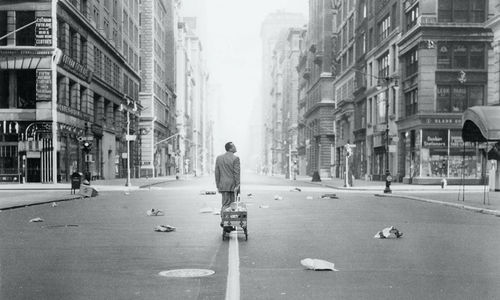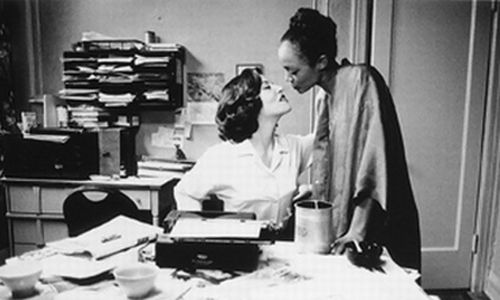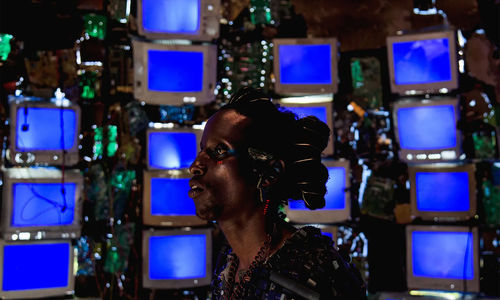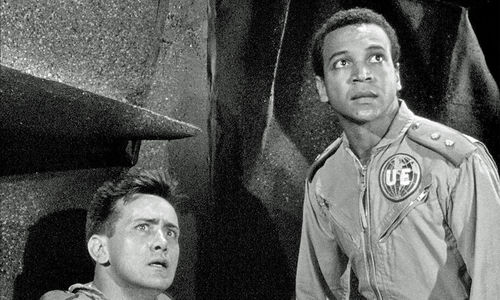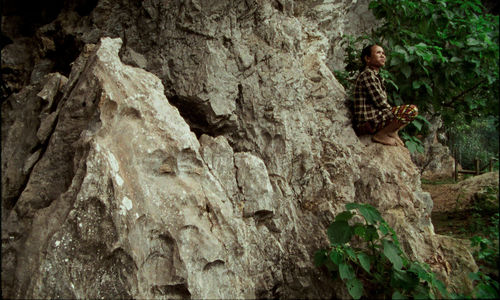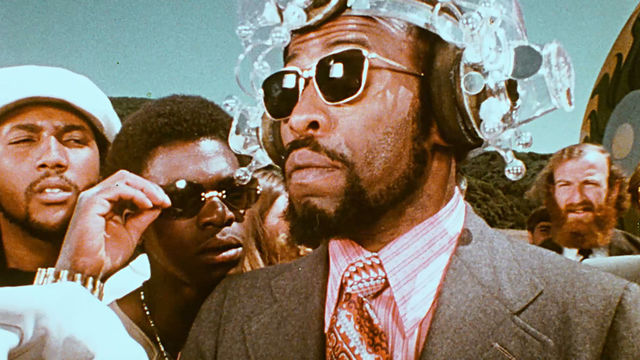
Afrofuturism: The Last Angel of History / Space is the Place
- This is a past program
Presented by the UCLA Film & Television Archive.
Part of the UCLA Film & Television Archive screening series Science Fiction Against the Margins. Learn more at cinema.ucla.edu.
In-person: artist and UCLA Professor Cauleen Smith and UCLA School of Theater, Film and Television Associate Professor Shelleen Greene.
H-E-L-L-O (2014)
Internationally acclaimed filmmaker, multimedia artist and UCLA Professor Cauleen Smith collaborated with avant-garde jazz guitarist Carl LeBlanc to convene the ensemble of New Orleans musicians who perform in this evocative summoning of creative energies. In 2014, at historic sites around the city, local musicians play the iconic five-tone motif from Close Encounters of the Third Kind on a variety of instruments. As the refrain repeats from scene to scene, Smith transforms a fictional greeting to aliens into a resonant assuagement of the alienation experienced by those residents who saw recovery give way to gentrification in the long wake of Hurricane Katrina.
DCP, color, 11 min. Director: Cauleen Smith.
Planet X (2006)
Pioneering media artist Ulysses Jenkins seized on the possibilities of video production technologies in the late 1970s to challenge the white supremacy behind representations of Black people and Blackness across mainstream media. In Planet X, Jenkins mobilizes still images, video effects, local news segments and Sun Ra’s interstellar prophesying in voiceover to rework apocalyptic myths of a mysterious planet-killer meteor. Telescoping across the vast reaches of space down to a few city blocks in New Orleans where human tragedy plays out in the immediate aftermath of Hurricane Katrina, Planet X projects a cosmic vision of Black destiny forged through catastrophe and salvation.
DCP, color, 6 min. Director: Ulysses Jenkins.
The Last Angel of History (1996)
An experimental documentary on the roots of Afrofuturism featuring interviews with some of its key architects, The Last Angel of History also plays like a radical transmission from beyond the stars. Director John Akomfrah, Ghanaian British artist, filmmaker and co-founder of the influential Black Audio Film Collective, evokes the myth of blues guitarist Robert Johnson to frame his exploration of art as a technology for social change. His preeminent evidence is Afrofuturism as conceived and practiced by musicians (Derrick May, George Clinton), novelists (Octavia Butler, Ishmael Reed) and critics (Greg Tate, Kodwo Eshun).
DCP, color, 45 min. Director: John Akomfrah. Screenwriter: Edward George.
Space Is the Place (1974)
Space Is the Place opens with legendary jazz composer and musician Sun Ra strolling purposefully through the forest of an alien planet. Majestic in Egyptian-style regalia and flanked by two spiritual adjutants in equally mythic garb, Ra projects a serene confidence as he deems the lush realm to be the perfect gift for Black people. “The music is different here … we’ll see what they can do on a planet all their own.” But first he must convince them to come. Working against this utopian operation is The Overseer (Raymond Johnson), a devil-figure in pimp’s clothes who challenges Ra to a card game for the soul of Black America with a little help from the forces of white supremacy in the form of sinister government agents. A psychedelic allegory with a dose of Blaxploitation, Space Is the Place emerged when producer Jim Newman and director John Coney approached Ra about expanding the concert footage of Sun Ra and his Arkestra they had shot for public television into a feature.
Ra contributed the interstellar storyline, a transcendent avant-garde score and a sustained, beguiling disquisition on his vision for Black liberation. Offering little in the way of a practical program, Ra centers the imaginary in the struggle for freedom as only a master conjurer could. As he tells a group of Black youths killing time in an Oakland community center surrounded by images on the walls of Huey Newton, Bobby Seale, Angela Davis, Eldridge Cleaver and Malcolm X: “I come to you as a myth because that’s what you are. Black people are a myth. You don’t exist.” But through creative expression, Ra transforms this seeming erasure, this absence, into the ultimate power to remake social reality.
DCP, color, 85 min. Director: John Coney. Screenwriters: Sun Ra, Joshua Smith. With: Sun Ra, Raymond Johnson, Christopher Brooks.
The UCLA Film & Television Archive is a division of UCLA Library, and presents its public programs in the Billy Wilder Theater at the Hammer, among other venues. For more information about the Archive, visit cinema.ucla.edu.
ATTENDING THIS PROGRAM?
Ticketing: Admission to Archive screenings at the Hammer is free. Your seat will be assigned to you when you pick up your ticket at the box office. Seats are assigned on a first come, first served basis, limit one per visitor. Box office opens one hour before the event. Questions should be directed to the Archive at programming@cinema.ucla.edu or 310-206-8013.
Member Benefit: Subject to availability, Hammer Members can choose their preferred seats and pick up tickets for one additional guest. Members receive priority ticketing until 15 minutes before the program. Learn more about membership.
Parking: Self-parking is available under the museum. Rates are $8 for the first three hours with museum validation, and $3 for each additional 20 minutes, with a $22 daily maximum. There is an $8 flat rate after 5 p.m. on weekdays, and all day on weekends.
Read our food, bag check, and photo policies.
Read our COVID-19 safety guidelines.




